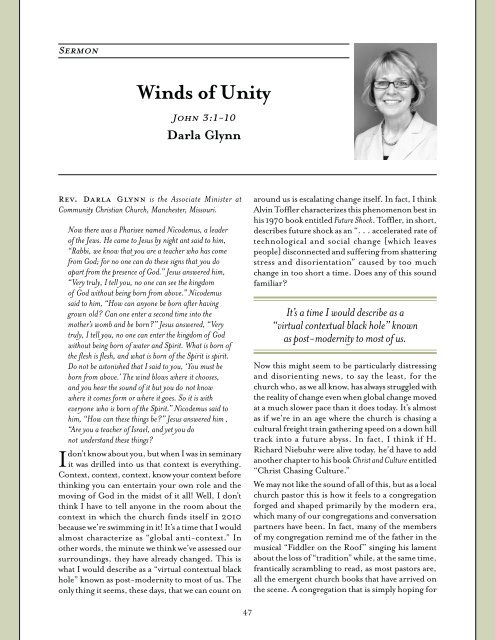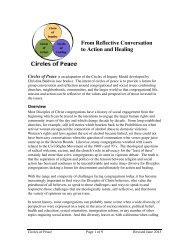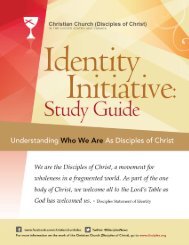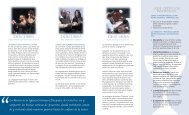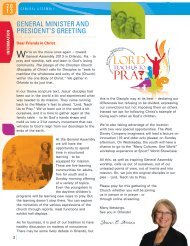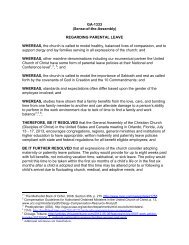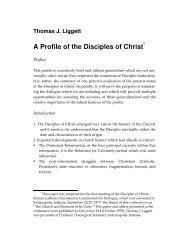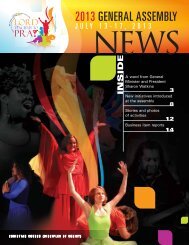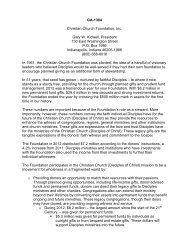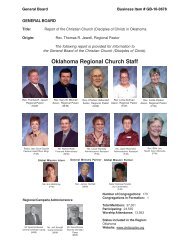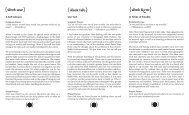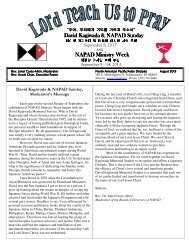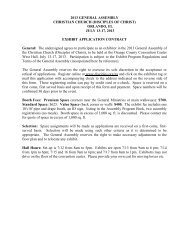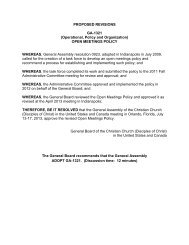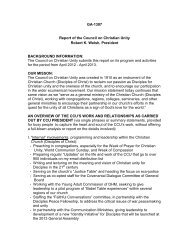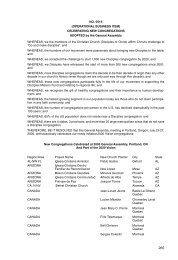RESOURCING THE CHURCH FOR ECUMENICAL MINISTRy A ...
RESOURCING THE CHURCH FOR ECUMENICAL MINISTRy A ...
RESOURCING THE CHURCH FOR ECUMENICAL MINISTRy A ...
You also want an ePaper? Increase the reach of your titles
YUMPU automatically turns print PDFs into web optimized ePapers that Google loves.
Sermon<br />
Winds of Unity<br />
John 3:1-10<br />
Darla Glynn<br />
Rev. Darla Glynn is the Associate Minister at<br />
Community Christian Church, Manchester, Missouri.<br />
Now there was a Pharisee named Nicodemus, a leader<br />
of the Jews. He came to Jesus by night ant said to him,<br />
“Rabbi, we know that you are a teacher who has come<br />
from God; for no one can do these signs that you do<br />
apart from the presence of God.” Jesus answered him,<br />
“Very truly, I tell you, no one can see the kingdom<br />
of God without being born from above.” Nicodemus<br />
said to him, “How can anyone be born after having<br />
grown old? Can one enter a second time into the<br />
mother’s womb and be born?” Jesus answered, “Very<br />
truly, I tell you, no one can enter the kingdom of God<br />
without being born of water and Spirit. What is born of<br />
the flesh is flesh, and what is born of the Spirit is spirit.<br />
Do not be astonished that I said to you, ‘You must be<br />
born from above.’ The wind blows where it chooses,<br />
and you hear the sound of it but you do not know<br />
where it comes form or where it goes. So it is with<br />
everyone who is born of the Spirit.” Nicodemus said to<br />
him, “How can these things be?” Jesus answered him ,<br />
“Are you a teacher of Israel, and yet you do<br />
not understand these things?<br />
I<br />
don’t know about you, but when I was in seminary<br />
it was drilled into us that context is everything.<br />
Context, context, context, know your context before<br />
thinking you can entertain your own role and the<br />
moving of God in the midst of it all! Well, I don’t<br />
think I have to tell anyone in the room about the<br />
context in which the church finds itself in 2010<br />
because we’re swimming in it! It’s a time that I would<br />
almost characterize as “global anti-context.” In<br />
other words, the minute we think we’ve assessed our<br />
surroundings, they have already changed. This is<br />
what I would describe as a “virtual contextual black<br />
hole” known as post-modernity to most of us. The<br />
only thing it seems, these days, that we can count on<br />
47<br />
around us is escalating change itself. In fact, I think<br />
Alvin Toffler characterizes this phenomenon best in<br />
his 1970 book entitled Future Shock. Toffler, in short,<br />
describes future shock as an “. . . accelerated rate of<br />
technological and social change [which leaves<br />
people] disconnected and suffering from shattering<br />
stress and disorientation” caused by too much<br />
change in too short a time. Does any of this sound<br />
familiar?<br />
It’s a time I would describe as a<br />
“virtual contextual black hole” known<br />
as post-modernity to most of us.<br />
Now this might seem to be particularly distressing<br />
and disorienting news, to say the least, for the<br />
church who, as we all know, has always struggled with<br />
the reality of change even when global change moved<br />
at a much slower pace than it does today. It’s almost<br />
as if we’re in an age where the church is chasing a<br />
cultural freight train gathering speed on a down hill<br />
track into a future abyss. In fact, I think if H.<br />
Richard Niebuhr were alive today, he’d have to add<br />
another chapter to his book Christ and Culture entitled<br />
“Christ Chasing Culture.”<br />
We may not like the sound of all of this, but as a local<br />
church pastor this is how it feels to a congregation<br />
forged and shaped primarily by the modern era,<br />
which many of our congregations and conversation<br />
partners have been. In fact, many of the members<br />
of my congregation remind me of the father in the<br />
musical “Fiddler on the Roof” singing his lament<br />
about the loss of “tradition” while, at the same time,<br />
frantically scrambling to read, as most pastors are,<br />
all the emergent church books that have arrived on<br />
the scene. A congregation that is simply hoping for


